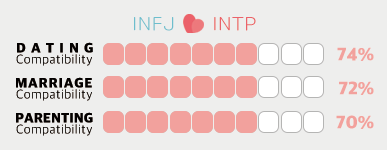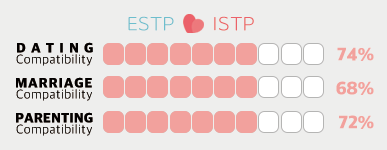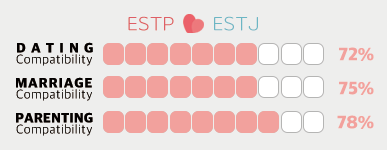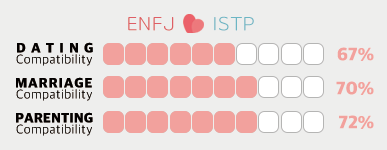ESFJ Female and INTJ Male Compatibility – The Emotional Caregiver and the Strategic Planner, Two Different Expression Styles
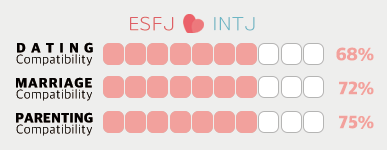
This couple might look stable on the surface.
The ESFJ woman is warm and caring, always looking after her partner.
The INTJ man is quiet, strategic, and leads with a sense of direction.
But the real challenge here is their “expression style.”
ESFJ is emotion-centered.
INTJ is logic-centered.
So, they need to translate each other’s feelings to understand one another.
How It All Starts
The ESFJ is usually the first to show interest.
She is drawn to the INTJ’s calm, composed demeanor.
The INTJ finds the ESFJ’s warmth overwhelming at first, but also comforting.
Initially, the ESFJ leads the connection, while the INTJ follows with a slower response.
But over time, the ESFJ might start wondering, “Does he even like me?”
Compatibility Score – 68%
They have very different core styles:
The ESFJ is all about emotions and current feelings.
The INTJ is all about big-picture planning and direction.
This difference can lead to misunderstandings.
Even when they talk, they might not always connect emotionally.
Relationship Style
The ESFJ loves frequent communication and emotional sharing:
“I miss you.”
“How was your day?”
“Are you feeling okay?”
The INTJ, even if he cares, is less expressive:
“Do we really need to say that out loud?”
Because of this, the ESFJ can feel lonely, and the INTJ can feel exhausted.
But if they understand each other’s style, most problems can be avoided.
Ideal Date Ideas
The ESFJ enjoys cozy cafés and emotionally engaging activities.
The INTJ prefers quiet, planned dates, often indoors.
Best Date Plan:
Brunch at a warm café
Visiting an art gallery or quiet bookstore
A peaceful walk together
Let the ESFJ create the atmosphere, while the INTJ handles the schedule.
This way, both their preferences are respected.
How They Argue
The ESFJ says, “Why won’t you talk about your feelings?”
The INTJ responds, “Is this really such a big issue?”
The ESFJ’s emotions increase, and she talks more.
The INTJ’s emotions rise, but he talks less.
It can turn into a long conversation with little resolution.
For the ESFJ, feelings are everything.
For the INTJ, logic and solutions are everything.
If They Break Up
The ESFJ initiates a breakup when her emotional needs are unmet.
The INTJ, if he decides to end it, has usually thought about it for a long time.
Both struggle to let go, but they handle it differently:
The ESFJ openly expresses sadness.
The INTJ quietly holds onto it without showing much.
Because their expressions are so different, they might feel like it ended without closure.
If They Get Married
The household is stable, but their communication can be a challenge.
The ESFJ focuses on emotional comfort and family atmosphere.
The INTJ focuses on structure, planning, and long-term direction.
If they divide roles well, they can become an excellent team.
But without regular emotional check-ins, the ESFJ may feel emotionally neglected.
Marriage Compatibility – 72%
The INTJ provides stability with plans and leadership.
The ESFJ provides warmth and emotional support.
But they must train themselves to communicate emotionally.
A daily habit of asking, “How are you feeling?” can do wonders.
Parenting Compatibility – 75%
The ESFJ focuses on the child’s emotional well-being and family bonding.
The INTJ focuses on education, discipline, and routine.
If they balance this well, they can create a very stable and structured environment.
But they may clash over how to handle emotional issues with the child.
The INTJ must be careful not to dismiss emotions as “illogical.”
Things to Watch Out For
The INTJ should not view the ESFJ’s emotional expression as “too much.”
The ESFJ should not mistake the INTJ’s quietness as a lack of love.
Always remember: “They express love differently.”
If they respect each other’s approach, they can become a very stable couple.
Final Thoughts
The ESFJ woman and the INTJ man are a mix of emotions and strategy.
They love deeply, but in completely different ways.
If they learn to translate each other’s “emotional language,”
they can achieve a connection that goes beyond words.
In the end, they don’t just understand each other—they balance each other.


